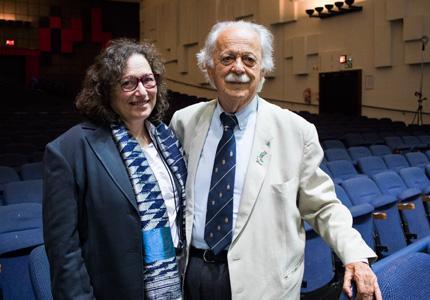A Gold Medal for the Legal Resources Centre
- Wits University
The University awarded the Legal Resources Centre (LRC) a Gold Medal for its sterling contribution to society.
The award was made to the LRC yesterday at the first ceremony of the 2017 graduations.
Receiving the award on behalf of the LRC, Janet Love, National Director of the LRC in South Africa extended her gratitude for the recognition.
“I would like to convey our appreciation to the Council of Wits University for the honour and distinction bestowed upon us through this award,” she said.
Anti-apartheid stalwart , Wits alumnus and Chairman of the LRC, Advocate George Bizos, who also attended the ceremony said the recognition and award was befitting.
”There have been fundamental changes at Wits University and I think those people who say that nothing has changed had better come to have a look. I am impressed. The Legal Resources Centre was founded by four people in the late 1970s. It became a very important organisation during the apartheid regime. It played a very important role in helping people who could not afford legal representation.”
The LRC’s contribution to society and its fight for justice for vulnerable people over the past three decades is notable. 
It provides free legal services for vulnerable people including those who suffer discrimination by reason of race, class, gender, disability or through historical, social and economic circumstances; and those who stand up against abuse of power and corruption.
During the Truth and Reconciliation Commission hearings, the LRC represented several families of victims of apartheid.
It successfully opposed, amongst others, the application for amnesty relating to the torture and death in detention of Steve Biko, the deaths of the Craddock Four, the application brought by Eugene De Kock and the amnesty of the Civil Co-operation Bureau.
In land struggles, the LRC’s lawyers played a key role in land legislation drafting and policy formulation processes. The LRC pioneered the first rural land claims as well as the legal and institutional frameworks for community landholding arrangements. For example, the Mfengu and Riemvasmaak cases were initiated before 1994. While Riemvasmaak successfully secured the return of 74 000ha of state land, the Mfengu were the first community in South Africa to have their ownership of 19 white-owned farms in the Tsitsikamma restored.
The LRC continues to be at the forefront of using the law in the pursuit of justice and freedom. One of its major successes is the 11 years of work in litigating against Anglo American on behalf of a group of miners suffering from silicosis. Judgment in the Silicosis Class Action matter was handed down on 13 May 2016 by the High Court certifying classes of mineworkers involving workers from 82 mines, owned by one (or more) of the 30 named respondents. In addition, the High Court declared that any claim that has been made for general damages will be made transmissible to the claimant’s estate if he dies prior to the finalisation of the case. This decision is a landmark development in the jurisprudence of class action litigation.
”The LRC seeks to advance development, equality and dignity, enabling our Constitution to use the law to make our constitutional framework deliver on its promise to all in South Africa. Yes, we provide free legal service to vulnerable people. We do this in a manner that is intended to deliver on the promise. It is intended to ensure that those who suffer discrimination. It is to deliver an alternative to them,” says Love.

